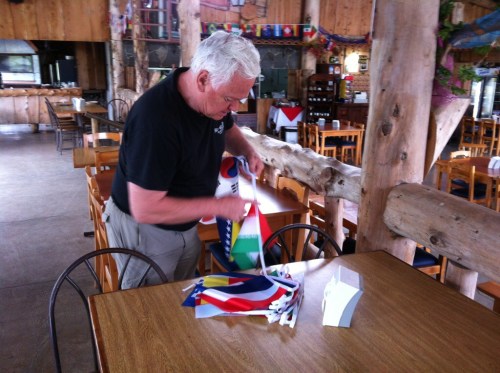I have a thing about volcanos. I haven’t traveled widely enough to see very many, but missing a couple of serious volcano opportunities are some of the few regrets I count in my life. We planned to visit at least one while we’re here, if we can ever get our customs issues sorted out.
Our Costa Rican family knows about my volcano thing and picked us up one morning to take us to one fairly close to San Jose. It was a chilly morning and Jack and I came to the big city completely unprepared for the weather, so Roberto and Grettel brought a jacket for Jack and a poncho for me and we started up into the mountains. As Roberto drove up and up and up we found ourselves in the clouds and visibility dropped to nearly nothing.
When we reached the park entrance the attendant told us the crater was completely socked in and we wouldn’t be able to see a thing, so we reluctantly turned around and headed back down out of the clouds, enjoying the spectacular views along the way.
We were all a little bummed until the ever-enthusiastic Roberto suddenly exclaimed, “I know where I’ll take you! It’s a place I’ve always wanted to go!” And we were off on a narrow bumpy blacktop deeper into the impenetrable Costa Rican forest.
I pulled out my map and asked Douglas where we were going. He pointed to a spot that told me nothing about what to expect, and after what to my butt felt like hours we parked on the berm by a sturdy timber hut on one side of the road, and a collection of smaller huts on the other. We had arrived at Guayabo National Monument, a place we’d never heard of and our Costa Rican family had never visited.
Guayabo, it turns out, is an ASCE Historic Civil Engineering Landmark and the most important archaeological site in Costa Rica. It was inhabited from about 1000 B.C. to 1400 A.D. and is important because of the extensive roadways, water supply, retaining walls and other structures. The aqueducts are still functional today. The name of the city and the people who lived there are still a mystery to researchers but the structures archaeologists have uncovered point to a large and complex civilization.
We walked the forest path in a chilly drizzle past rectangular tombs, carvings and glyphs until we were lead up a stairway to an overlook revealing the entire layout of what’s been uncovered so far.
The Costa Rican archaeologists did a great job in the first phase of developing the site. The paved roads apparently go many kilometers in all directions but only a small section has been reconstructed so far; the rest is swallowed up in the forest. The whole site is a reminder of how completely our human endeavors can disappear, and how quickly our history is forgotten.
This surprise excursion was right up our alley and we’re so grateful Roberto and Grettel thought to take us there. We’d have never found it on our own, and the drive to and from showed us more of the beautiful Costa Rican countryside.
To top off the day we went to a lovely farm restaurant for a typical Costa Rican lunch. The owners produce a variety of cheeses, which Roberto and Grettel took full advantage of, and Douglas talked the boss out of one of the strings of flags left over from the World Cup.






















This is right up my alley as a civil engineer. The food looks great too!
I’ve been to the Poas volcano near San Jose, and if you can, try to go back! Also, if you have’t been, there is a very nice restaurant on a mountain overlooking the city. It is in an old monastery, and I think the name is Le Monastere.
It’s great to hear from you, Brendan! And thanks for the tips. We’ll check it out next time we’re back in the city.